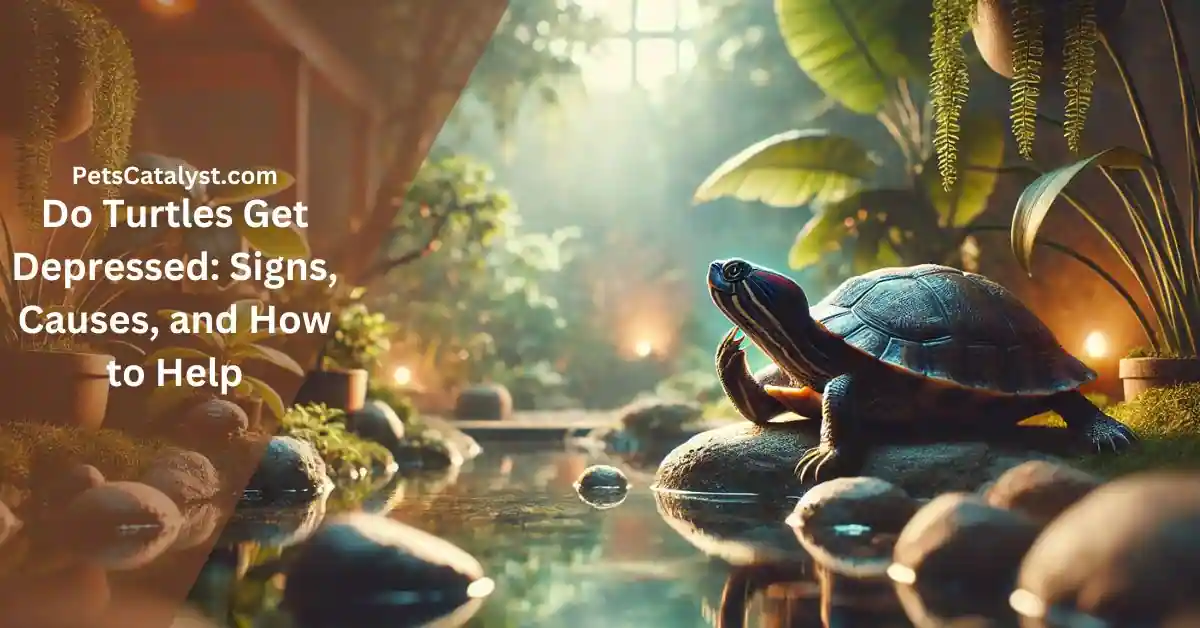Have you ever found yourself wondering, do turtles get depressed? As the parent to a turtle myself, I often find myself watching my shelled friend and wondering about their emotional wellbeing. Though turtles might not had the ability to throw a tantrum or cuddle like most other pets do it, they do express how they are feeling in so many ways.
But that is not enough. So let’s dive deeper into their world and uncover whether these slow creatures experience feelings like depression.
Understanding Turtle Behavior
Turtles don’t tend to be social butterflies like some animals do – they don’t wag tails or chase balls like dogs do; but each turtle does possess unique personalities – some prefer swimming around while others just prefer basking in the warmth (much like my lazy cat!).

But do reptiles, for instance, turtles feel emotion? Unluckily, science has not given the final answer to this question, although many think they do have something similar to depression or stress – even if not identically as humans do.
Do Turtles Really Feel Depression Like Humans?
Are you a turtle parent and curious about do turtles get depressed? Okay, Turtles do not get depressed like human being, but that does not mean that they do not feel uncomfortable in their environment. It could be a little hard to evaluate such emotions as sadness or joy but we can observe their response to changes to their environment.
Signs of Stress or Depression in Turtles
How can you tell if your turtle is feeling sad? Here are a few clues:
- Lethargy: Turtles that become less active over time or remain still may be experiencing stress.
- Loss of Appetite: If your turtle does not take its food as fast as often they do this may be an indication that the turtle is uncomfortable or depressed.
- Hiding: While turtles are very fond of their shells, if your turtle seems to avoid people or avoid its home like environment it may be a sign that help is needed.
- Unusual Behaviors: Unexpected swimming or basking activity could indicate something is amiss with your turtle’s mental wellbeing.
Turtles don’t express themselves in words like human do; but their actions provide plenty of clues to interpret their behaviors.
You May Like to Read:
- How Long Can a Baby Turtle Stay Out of Water?
- Can Turtles Eat Ants?
- How To Keep Turtle Tank Water Clear?
Causes of Depression or Stress in Turtles
If you have noticed any of the above indicators, it may be time for action! Turtles can become distressed for various reasons:

- Inadequate Tank Conditions: Turtles can be very particular about their environment. If the temperature or lighting doesn’t suit them properly, or there’s inadequate coverage of water surfaces in their tank, this can really ruin their mood – creating cold or dirty conditions in which your turtle could become discontented and aggressive.
- Improper Diet: Just like humans can become cranky when hungry (I know I do!), turtles require proper nutrition in order to remain healthy. A diet devoid of vitamins can lead to stress or illness in turtles.
- Absence of Stimulation: Imagine being trapped inside for too long with nothing interesting or engaging to explore in their tank, no hiding spots to explore, no interesting items to investigate and too small a space can lead to boredom and depression in turtles.
- Social Isolation: While certain turtle species prefer solitude, others can benefit from having some company. If your social turtle is left all by itself, it may start feeling neglected.
How to Help a Depressed or Stressed Turtle
Don’t despair – there is hope! If your turtle seems sad, here is how you can assist:
Video Credit: wikiHow
- Enhance Habitat: To keep your turtle healthy and happy as possible, the temp of the water should be ideal, the tank should be clean and the light should be sufficient. Warmer temperatures and UVB light are essential for keeping your turtle healthy and happy.
- Provide Enrichment: You should manage some toys for your turtles – this may be including plants, rocks, or tunnels into which your turtle may hide among and climb. They will have lots of ways to enjoy it with these inspiring touches!
- Feed Your Turtle an Appropriate Diet: In order to maintain the proper health of your turtle feed them fresh, healthy vegetables, proteins, and other supplements of different kinds. If any doubts just consult with a vet as soon as you can.
- Vet Checkups: If you still have any doubts about your turtle and the advice given above doesn’t work, you should take your turtle to a veterinarian who deals specifically with reptiles and other cold-blooded animals. A specialist veterinarian will be able to detect any health problems which might be contributing to its behavior and can give an assessment.
Quick Guide
| Sign of Stress/Depression | Possible Cause | Solution |
|---|---|---|
| Lack of movement | Incorrect tank temperature | Adjust water and basking area temperature |
| Loss of appetite | Poor diet or illness | Provide a balanced diet; consult a vet |
| Hiding frequently | Inadequate habitat setup | Add hiding spots and enrich the environment |
| Erratic swimming | Poor water quality | Regularly clean the tank and filter water |
| Excessive basking | Insufficient UVB light | Ensure proper lighting for UVB absorption |
FAQs on Do Turtles Get Depressed
Can turtles express emotions like humans do?
Though turtles may not feel emotions like humans or pets like dog and cat do, they still experience stress, discomfort and can react to their environment.
What should I do if my turtle is not eating or is hardly moving?
At first you need some inspection. Make it sure that their habitat has suitable temperature, lighting and water quality. If the behavior persists, consult a reptile vet immediately.
How can I improve the living conditions for my turtle to reduce stress levels?
Be sure to give your turtle enough room in its tank, with ideal lighting and temperature conditions, hiding spots or interactive elements for entertainment, and plenty of enrichment activities – all these steps will contribute to long term happiness! This simple step will ensure a long life for a happy turtle!
References:
- Reptiles Magazine
- VetStreet – Common Health Problems in Turtles
- The Spruce Pets – Signs of a Healthy Turtle
So, do turtles get depressed? It is just like they cannot be depressed like other animals, or humans in this case, but are absolutely capable of displaying signs of discomfort when they feel. It becomes a great importance for turtle parents to ensure that they provide the best home environment fulfilling the physical and psychological aspects.
It is therefore very important to learn their behavior and make sure that they are well taken care of, so that they can never suffer from stress or even depression. Happy turtle indeed means a healthy turtle!










